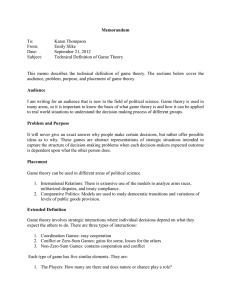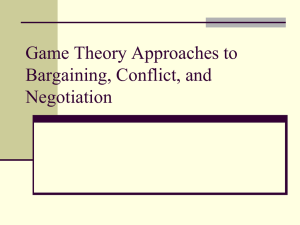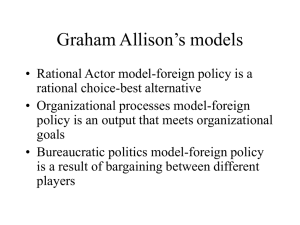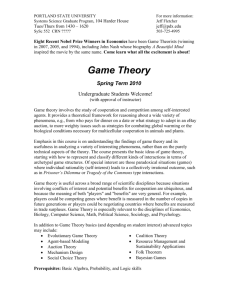MBA 217-1 Game Theory Approaches to Bargaining, Conflict, and
advertisement
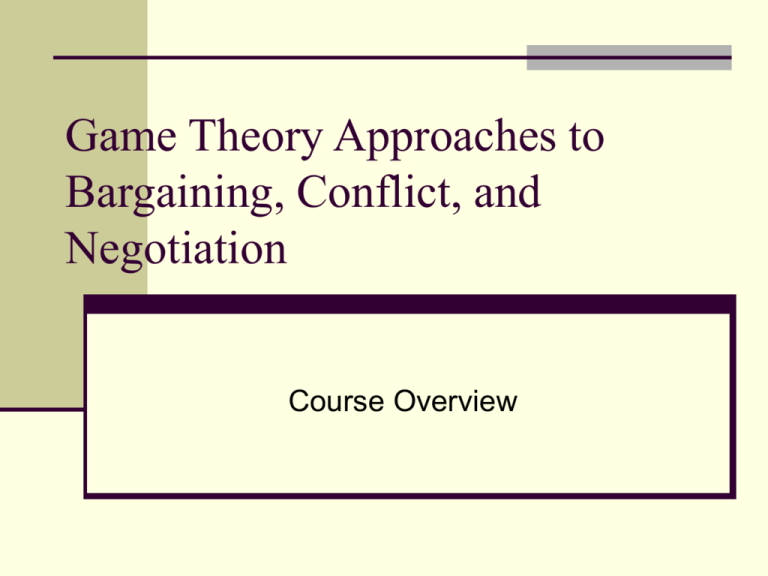
Game Theory Approaches to Bargaining, Conflict, and Negotiation Course Overview Price Dispersion Visit any Internet price comparison site and you’ll notice a large range in prices for an identical item Why the range in prices? Branding Awareness Stock on hand Strategy The Strategy of Unpredictability Firms sell to price conscious shoppers as well as “loyal” consumers Cutting price to attract shoppers eats into profits from loyals At the same time, offering a low price has a big payoff from the shoppers (elasticity = 51). It pays for a firm to be unpredictable in its pricing CPU Competition Intel and AMD compete fiercely to develop innovations in CPUs for PCs As a result of this, CPU speeds have increased dramatically, but there are few differences between the products of the two companies Prisoner’s Dilemma Even though both companies expended huge amounts of money to gain a competitive advantage, their relative competitive position ends up unchanged. Both companies are worse off than if they had each slackened the pace of innovation This is an example of a prisoner’s dilemma Sale Price Guarantees Circuit City and many other stores offer sale price guarantees If an item comes on sale in the time period after you bought it, they will match the difference in prices Thus, consumers wishing to buy now are “protected” against regrets from future price reductions Walking Down the Demand Curve Circuit City would like to sell goods at high prices to those with high willingness to pay for them and then lower prices to capture those with lower willingness to pay. They might do this by running sales after new items have been out for a while But high value consumers will anticipate this and wait for the sale to occur. The Power of Commitment By offering to rebate back the difference in prices, Circuit City makes the sale strategy less profitable for its “future” self. This commits it to less discounting in the future And enables it to charge higher prices today…and tomorrow. Seasoned Equity Offerings When owner-managed companies make seasoned equity offerings, the price of its stock declines by more than the dilution from the new offering Why should this be? Companies seek access to equity finance because they have some promising new project Isn’t this good news about the company? Signaling The seasoned offering is a signal about the status of the companies current projects as well as future ones. If the current projects are not profitable, the cost (in dilution) to the owner-manager of issuing new share is lower. Therefore, the seasoned offering indicates bad news about the present condition of the firm as well as a low threshold for the profitability of the new project Strategies for Studying Games of Strategy Two general approaches Case-based Pro: Relevance, connection of theory to application Con: Generality Theory Pro: General principle is clear Con: Applying it may not be Approach of this course Intermediate between theory and cases Lectures organized around a single general principle. Illustrated with cases and experiments Cases are “stripped down” to essentials Constant reality checks When does theory work? When doesn’t it? Why doesn’t it? Some Background Common to All Games Games versus Decisions Nature is not a strategic player Individual decisions might still be games if there are control problems with future “self” Large versus Small Numbers Games typically thought to pertain to small numbers of players But large markets can become small Bilateral contracting/holdup problems Information/signaling – market for venture capital Classifying Games Sequential v simultaneous Stackelberg/Cournot Distributive v integrative Matching pennies/coordination One-shot v repeated Public v private information Fixed v manipulable rules Enforceable v unenforceable cooperative agreements Terminology Strategies Choices available to each of the players Might be conditioned on history Payoffs Some numerical representation of the objectives of each player Could take account fairness/reputation, etc. Does not mean players are narrowly selfish Standard Assumptions Rationality Players are perfect calculators and implementers of their desired strategy Common knowledge of rules All players know the game being played Equilibrium Players play strategies that are mutual best responses The Uses of Game Theory Explanatory A lens through which to view and learn from past negotiations/conflicts Predictive With many caveats Prescriptive The main thing you’ll take out of the course is an ability to think strategically
